- Home
- E. F. Benson
Mrs. Ames
Mrs. Ames Read online
THE BLOOMSBURY GROUP
Henrietta’s War by Joyce Dennys
Henrietta Sees It Through by Joyce Dennys
The Brontës Went to Woolworths by Rachel Ferguson
Miss Hargreaves by Frank Baker
Love’s Shadow by Ada Leverson
A Kid for Two Farthings by Wolf Mankowitz
Mrs Tim of the Regiment by D. E. Stevenson
Let’s Kill Uncle by Rohan O’Grady
Mrs Harris Goes to Paris and Mrs Harris Goes to New York
by Paul Gallico
A NOTE ON THE AUTHOR
The son of E. W. Benson, an archbishop of Canterbury (1883–96), E. F. BENSON was educated at Marlborough School and at King’s College, Cambridge. After graduation he worked from 1892 to 1895 in Athens for the British School of Archaeology and later in Egypt for the Society for the Promotion of Hellenic Studies. In 1893 he published Dodo, a novel that attracted wide attention. It was followed by a number of other successful novels including his hugely popular Mapp and Lucia series. In 1938 he was made an honorary fellow of Magdalene College, Cambridge. He died in February, 1940.
Mrs Ames first published in Great Britain 1912
This electronic edition published in 2010 by Bloomsbury Publishing Plc
Copyright by The Executors of the Estate of K S P McDowall
The moral right of the author has been asserted
Ex libris illustration © Penelope Beech 2010
Bloomsbury Publishing Plc, 36 Soho Square, London W1D 3QY
A CIP catalogue record for this book is available from the British Library
All rights reserved
You may not copy, distribute, transmit, reproduce or otherwise make available this publication (or any part of it) in any form, or by any means (including without limitation electronic, digital, optical, mechanical, photocopying, printing, recording or otherwise), without the prior written permission of the publisher. Any person who does any unauthorised act in relation to this publication may be liable to criminal prosecution and civil claims for damages
ISBN 978 1 4088 1379 9 (ebook)
10 9 8 7 6 5 4 3 2 1
Visit www.bloomsbury.com to find out more about our authors and their books You will find extracts, author interviews, author events and you can sign up for newsletters to be the first to hear about our latest releases and special offers
Mrs Ames
E. F. Benson
B L O O M S B U R Y
LONDON • BERLIN • NEW YORK
CERTAINLY the breakfast tongue, which was cut for the first time that morning, was not of the pleasant reddish hue which Mrs Altham was justified in expecting, considering that the delicacy in question was not an ordinary tinned tongue (you had to take things as you found them, if your false sense of economy led you to order tinned goods) but one that came out of a fine glass receptacle with an eminent label on it. It was more of the colour of cold mutton, unattractive if not absolutely unpleasant to the eye, while to the palate it proved to be singularly lacking in flavour. Altogether it was a great disappointment, and for this reason, when Mr Altham set out at a quarter past twelve to stroll along to the local club in Queensgate Street with the ostensible purpose of seeing if there was any fresh telegram about the disturbances in Morocco, his wife accompanied him to the door of that desirable mansion, round which was grouped a variety of chained-up dogs in various states of boredom and irritation, and went on into the High Street in order to make in person a justifiable complaint at her grocer’s. She would be sorry to have to take her custom elsewhere, but if Mr Pritchard did not see his way to sending her another tongue (of course without further charge) she would be obliged …
So this morning there was a special and imperative reason why Mrs Altham should walk out before lunch to the High Street, and why her husband should make a morning visit to the club. But to avoid misconception it may be stated at once that there was, on every day of the week except Sunday, some equally compelling cause to account for these expeditions. If it was very wet, perhaps, Mrs Altham might not go to the High Street, but wet or fine her husband went to his club. And exactly the same thing happened in the case of most of their friends and acquaintances, so that Mr Altham was certain of meeting General Fortescue, Mr Brodie, Major Ames, and others in the smoking room, while Mrs Altham encountered their wives and sisters on errands like her own in the High Street. She often professed superior distaste for gossip, but when she met her friends coming in and out of shops, it was but civil and reasonable that she should have a few moments’ chat with them. Thus, if any striking events had taken place since the previous afternoon, they all learned about them. Simultaneously there was a similar interchange of thought and tidings going on in the smoking room at the club, so that when Mr Altham had drunk his glass of sherry and returned home to lunch at one-thirty, there was probably little of importance and interest which had not reached the ears of himself or his wife. It could then be discussed at that meal.
Queensgate Street ran at right angles to the High Street, debouching into that thoroughfare at the bottom of its steep slope, while the grocer’s shop lay at the top of it. The morning was a hot day of early June, but to a woman of Mrs Altham’s spare frame and active limbs, the ascent was no more than a pleasurable exercise, and the vivid colour of her face (so unlike the discouraging hues of the breakfast tongue) was not the result of her exertions. It was habitually there, and though that and the restlessness of her dark and rather beady eyes might have made a doctor, on a cursory glance (especially if influenza was about), think that she suffered from some slight rise of temperature, he would have been in error. Her symptoms betokened not an unnatural warmth of the blood, but were the visible sign of her eager and slightly impatient mind. Like the inhabitants of ancient Athens, she was always on the alert to hear some new thing (though she disliked gossip), but her mind appreciated the infinitesimal more than the important. The smaller a piece of news was, the more vivid was her perception of it, and the firmer her grip of it: large questions produced but a vague impression on her.
Her husband, a retired solicitor, was singularly well adapted to be the partner of her life, for his mind was very much akin to hers, and his appetite for news no less rapacious. Indeed, the chief difference between them in this respect was that she snapped at her food like a wolf in winter, whereas he took it quietly, in the manner of a leisurely boa constrictor. But his capacity was in no way inferior to hers. Similarly, they practised the same harmless hypocrisies on each other, and politely forbore to question each other’s sincerity. An instance has already been recorded where such lack of trust might have been manifested, but it never entered Mrs Altham’s head to tell her husband just now that he cared nothing whatever about the disturbances in Morocco, while she would have thought it very odd conduct on his part to suggest that a sharply worded note to Mr Pritchard would save her the walk uphill on this hot morning. But it was only sensible to go on their quests; had they not ascertained if there was any news, they would have had nothing to talk about at lunch. As it was, conversation never failed them, for this little town of Riseborough was crammed with interest and incident, for all who felt a proper concern in the affairs of other people.
The High Street this morning was very full, for it was market day, and Mrs Altham’s progress was less swift than usual. Barrows of itinerant vendors were crowded into the road from the edge of the pavements, leaving a straitened channel for a traffic swelled by farmers’ carts and occasional droves of dusty and perplexed looking cattle, being driven in from the country round. More than once Mrs Altham had to step into the doorway of some shop to avoid the random erring of a company of pigs or sheep which made irruption on to the pavement. But it was interesting to observe, in one such enforced pause, the impeded passage of Sir James Wes
tbourne’s motor, with the owner, broad-faced and good-humoured, driving himself, and to conjecture as to what business brought him into the town. Then she saw that there was his servant sitting in the body of the car, while there were two portmanteaus on the luggage rail behind. There was no need for further conjecture: clearly he was coming from the South-Eastern station at the top of the hill, and was driving out to his place four miles distant along the Maidstone road. Then he caught sight of somebody on the pavement whom he knew, and, stopping the car, entered into conversation.
For the moment Mrs Altham could not see who it was; then, as the car moved on again, there appeared from behind it the tall figure of Dr Evans. Mrs Altham was not so foolish as to suppose that their conversation had necessarily anything to do with medical matters; she did not fly to the conclusion that Lady Westbourne or any of the children must certainly be ill. To a person of her mental grasp it was sufficient to remember that Mrs Evans was Sir James’ first cousin. She heard also the baronet’s cheerful voice as the two parted, saying, ‘Saturday the twenty-eighth, then. I’ll tell my wife.’ That, of course, settled it; it required only a moment’s employment of her power of inference to make her feel convinced that Saturday the twenty-eighth would be the date for Mrs Evans’ garden party. There were a good many garden parties in Riseborough about then, for strawberries might be expected to be reasonably cheap. Probably the date had been settled only this morning; she might look forward to receiving the ‘At Home’ card (four to seven) by the afternoon post.
The residential quarters of Riseborough lay both at the top of the hill, on which the town stood, clustering round the fine old Norman church, and at the bottom, along Queensgate Street, which passed into the greater spaciousness of St Barnabas Road. On the whole, that might be taken to be the Park Lane of the place, and commanded the highest rents; every house there, in addition to being completely detached, had a small front garden with a carriage drive long enough to hold three carriages simultaneously, if each horse did not mind putting its nose within rubbing distance of the carriage in front of it, while the foremost projected a little into the road again. But there were good houses also at the top of the hill, where Dr Evans lived, and those who lived below naturally considered themselves advantageously placed in being sheltered from the bleak easterly winds which often prevailed in spring, while those at the top wondered among themselves in sultry summer days how it was possible to exist in the airless atmosphere below. The middle section of the town was mercantile, and it was here that the ladies of the place, both from above and below, met each other with such invariable fortuitousness in the hours before lunch. Today, however, though the street was so full, it was for purposes of news-gathering curiously deserted, and apart from the circumstance of inferentially learning the date of Mrs Evans’ garden party, Mrs Altham found nothing to detain her until she had got to the very door of Mr Pritchard’s grocery. But there her prolonged fast was broken; Mrs Taverner was ready to give and receive, and after the business of the colourless tongue was concluded in a manner that was perfectly creditable to Mr Pritchard, the two ladies retraced their steps (for Mrs Taverner was of St Barnabas Road) down the hill again.
Mrs Taverner quite agreed about the strong probability of Mrs Evans’ garden party being on the twenty-eighth, and proceeded to unload herself of far more sensational information. She talked rather slowly, but without ever stopping of her own accord, so that she got as much into a given space of time as most people. Even if she was temporarily stopped by an interruption, she kept her mouth open, so as to be able to proceed at the earliest possible moment.
‘Yes, three weeks, as you say, is a long notice, is it not?’ she said, ‘but I’m sure people are wise to give long notice, otherwise they will find all their guests are already engaged, such a quantity of parties as there will be this summer. Mrs Ames has sent out dinner cards for exactly the same date, I am told. I daresay they agreed together to have a day full of gaiety. Perhaps you are asked to dine there on the twenty-eighth, Mrs Altham?’
‘No, not at present.’
‘Well, then, it will be news to you,’ said Mrs Taverner, ‘if what I have heard is true, and it was Mrs Fortescue’s governess who told me, whom I met taking one of the children to the dentist.’
‘That would be Edward,’ said Mrs Altham unerringly. ‘I have often noticed his teeth are most irregular: one here, another there.’
She spoke as if it was more usual for children to have all their teeth on the same spot, but Mrs Taverner understood.
‘Very likely; indeed, I think I have noticed it myself. Well, what I have to tell you seems very irregular, too; Edward’s teeth are nothing to it. It was talked about, so Miss - I can never recollect her name, and, from what I hear, I do not think Mrs Fortescue finds her very satisfactory - it was talked about, so Mrs Fortescue’s governess told me, at breakfast time, and it was agreed that General Fortescue should accept, for if you are asked three weeks ahead it is no use saying you are engaged. No doubt Mrs Ames gave that long notice for that very reason.’
‘But what is it that is so irregular?’ asked Mrs Altham, nearly dancing with impatience at these circumlocutions.
‘Did I not tell you? Ah, there is Mrs Evans; I was told she was asked too, without her husband. How slowly she walks; I should not be surprised if her husband had told her never to hurry. She did not see us; otherwise we might have found out more.’
‘About what?’ asked the martyred Mrs Altham.
‘Why, what I am saying. Mrs Ames has asked General Fortescue to dine that night, without asking Mrs Fortescue, and has asked Mrs Evans to dine without asking Dr Evans. I don’t know who the rest of the party are. I must try to find time this afternoon to call on Mrs Ames, and see if she lets anything drop about it. It seems very odd to ask a husband without his wife, and a wife without her husband. And we do not know yet whether Dr Evans will allow his wife to go there without him.’
Mrs Altham was suitably astounded.
‘But I never heard of such a thing,’ she said, ‘and I expect my memory is as’ (she nearly said ‘long’, but stopped in time) ‘clear and retentive as that of most people. It seems very strange: it will look as if General Fortescue and his wife are not on good terms, and, as far as I know, there is no reason to suppose that. However, it is none of my business, and I am thankful to say that I do not concern myself with things that do not concern me. Had Mrs Ames wanted my advice as to the desirability of asking a husband without a wife, or a wife without a husband, I should have been very glad to give it her. But as she has not asked it, I must suppose that she does not want it, and I am sure I am very thankful to keep my opinion to myself. But if she asked me what I thought about it, I should be compelled to tell her the truth. I am very glad to be spared any such unpleasantness. Dear me, here I am at home again. I had no idea we had come all this way.’
Mrs Taverner seemed inclined to linger, but the other had caught sight of her husband’s face looking out of the window known as his study, where he was accustomed to read the paper in the morning, and go to sleep in the evening. This again was very irregular, for the watch on her wrist told her that it was not yet a quarter past one, the hour at which he invariably ordered a glass of sherry at the club, to fortify him for his walk home. Possibly he had heard something about this revolutionary social scheme in the club, and had hastened his return in order to be able to talk it over with her without delay. For a moment it occurred to her to ask Mrs Taverner to join them at lunch, but, after all, she had heard what that lady had to tell, and one of the smaller bundles of asparagus could not be considered ample for more than two. So she checked the hospitable impulse, and hurried into his study, alert with suppressed information, though she did not propose to let it explode at once, for the method of them both was to let news slip out as if accidentally. And, even as she crossed the hall, an idea for testing the truth of what she had heard, which was both simple and ingenious, came into her head. She despised poor Mrs Taverner’s scheme o
f calling on Mrs Ames, in the hope of her letting something drop, for Mrs Ames never let things drop in that way, though she was an adept at picking them up. Her own plan was far more effective. Also it harmonized well with the system of mutual insincerities.
‘I have been thinking, my dear,’ she said briskly, as she entered his study, ‘that it is time for us to be asking Major and Mrs Ames to dinner again. Yes: Pritchard was reasonable, and will send me another tongue, and take back the old one, which I am sure I am quite glad that he should do, though it would have come in for savouries very handily. Still, he is quite within his rights, since he does not charge for it, and I should not think of quarrelling with him because he exercises them.’
Mr Altham was as keen a housekeeper as his wife.
‘Its colour would not have signified in a savoury,’ he said.
‘No, but as Pritchard supplies a new tongue without charge, we cannot complain. About Mrs Ames, now. We dined with them quite a month ago: I do not want her to think we are lacking in the exchange of hospitalities, which I am sure are so pleasant on both sides.’
Mr Altham considered this question, caressing the side of his face. There was no doubt that he had a short pointed beard on his chin, but about halfway up the jawbone the hair got shorter and shorter, and he was quite clean-shaven before it got up to his ear. It was always a question, in fact, among the junior and less respectful members of the club, whether old Altham had whiskers or not. The general opinion was that he had whiskers, but was unaware of that possession.
‘It is odd that the idea of asking Mrs Ames to dinner occurred to you today,’ he said, ‘for I was wondering also whether we did not owe her some hospitality. And Major Ames, of course,’ he added.
Mrs Altham smiled a bright detective smile.
‘Next week is impossible, I know,’ she said, ‘and so is the week after, as there is a perfect rush of engagements then. But after that, we might find an evening free. How would it suit you, if I asked Mrs Ames and a few friends to dine on the Saturday of that week? Let me count - seven, fourteen, twenty-one, yes; on the twenty-eighth. I think that probably Mrs Evans will have her garden party on that day. It would make a pleasant ending to such an afternoon. And it would be less of an interruption to both of us, if we give up that day. It would be better than disarranging the week by sacrificing another evening.’

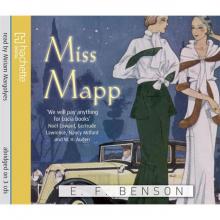 Miss Mapp
Miss Mapp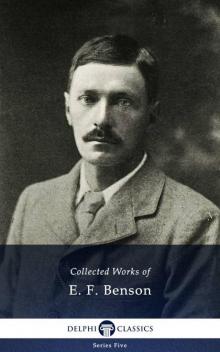 Works of E F Benson
Works of E F Benson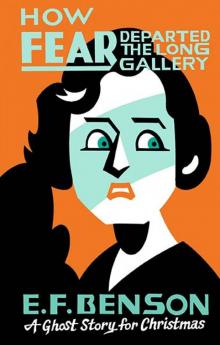 How Fear Departed the Long Gallery
How Fear Departed the Long Gallery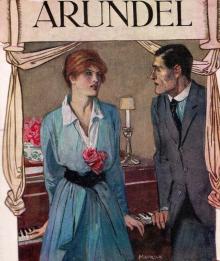 Dodo's Daughter: A Sequel to Dodo
Dodo's Daughter: A Sequel to Dodo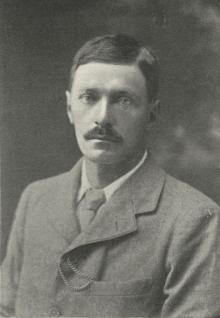 The House of Defence v. 1
The House of Defence v. 1 Queen Lucia
Queen Lucia Night Terrors
Night Terrors Lucia Victrix
Lucia Victrix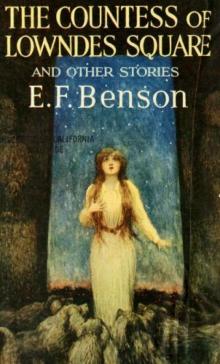 The Countess of Lowndes Square and Other Stories
The Countess of Lowndes Square and Other Stories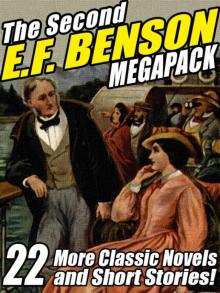 The Second E. F. Benson Megapack
The Second E. F. Benson Megapack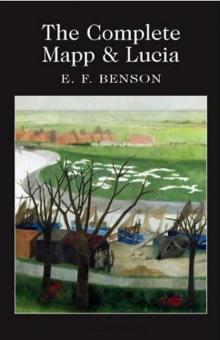 The Complete Mapp & Lucia
The Complete Mapp & Lucia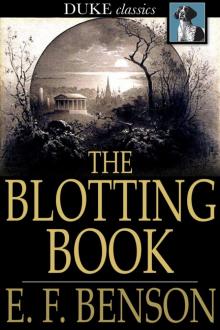 The Blotting Book
The Blotting Book The E. F. Benson Megapack
The E. F. Benson Megapack Lucia Rising
Lucia Rising Ghost Stories
Ghost Stories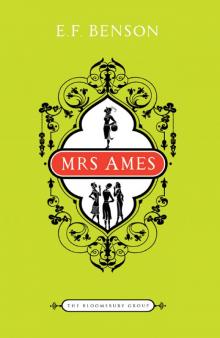 Mrs. Ames
Mrs. Ames E. F. Benson
E. F. Benson